


Extra! Extra!
By Nadeem F. Paracha
19 November 2009
Islamabad, November 18: Famous anti-India TV personality, Zion Hamid, was caught yesterday watching Shakuntali, a popular Indian TV soap opera. The discovery was made by one of his fans who Hamid thought was his milkman.
When Hamid opened his door, the fan heard and saw the TV in the background where episode No. 5, 904 of Shakuntali was running. Talking to this reporter, the fan said that he first thought it was a conspiracy, but after noticing the genuine red cap of Hamid, he was astonished.
Shaken, the fan, 23-year-old Abdul Karim, said: ‘I couldn’t believe it! What would Muhammad Bin Qasim think when he gets to hear about this?’
When told by this reporter that Qasim died hundreds of years ago, the fan accused him and his newspaper for working for Blackwater.
‘What you think you fool Mossad, CIA, Raw agent Qasim alive in our minds, hearts and lungs so oh you shut up!’ he added.
Talking to the media after the episode, Hamid accepted that he sometimes watches Indian soaps and that even though he is of the opinion that Hindus are paleed (dirty), there is no harm in watching them on TV because they can’t touch you and can’t cast their shadow over you.
He added that he also watches Indian soaps to decode the hidden plots of the Hindus to destroy Pakistan and Islam.
‘It was by decoding the dialogue of one such Indian TV soap that I was able to discover that the Mumbai attacks were actually planned and executed by Raw and Mossad,’ he explained.
He also said that he predicted the 9/11 attacks as a Zionist conspiracy back in 1996 by watching Dil Walay Dullaniya Lay Jain Gey on his VCD player over and over again.
‘It’s all there,’ he claimed. ‘And the songs aren’t all that bad either.’
Hamid was surrounded by a vocal group of fans at the press conference.
One Barkat Ali told the reporters: ‘What this happening? Attacking great man Zion, oh so brilliant genius zindabad, zindabad you kafir Western conspiracy US agent traitors fool, fool, fool!’
Another, Sharmeen Khan, a 25-year-old university student added: ‘What this nonsense of democracy because it only Hindu, American, Zionist, Papua New Guinnean plot to destroy beloved Pakistian zindabad, zindabad, zindabad!’
Kamran Ghani, a seven-month-old toddler also addressed the press conference. He said, ‘Goo goo gagagaga goo goo … burp!’
The fans then lifted Hamid on their shoulders and carried him to a nearby McDonald’s outlet where they all chanted slogans like ‘Amreeka ki ghulami namazoor’ over a couple of Big Macs, large Cokes and a romantic song sung by Wali Azmat called, ‘I hate Jews Yea, Yea, Yea,’ a song from Azmat’s forthcoming album, ‘Zionists ate my Homework.’
The album is dedicated to all the Taliban who died in American drone attacks. When asked why didn’t he also dedicate the album to all those who’ve died from Taliban’s suicide attacks, Azmat said, that there were no suicide bomb attacks in Pakistan and that all those people we see slaughtered and dismembered on our TV screens actually died from dengue fever. When asked how he can prove this, he said that one should watch the third season of Buffy the Vampire Slayer.
‘It’s all there,’ he claimed. ‘And the chicks aren’t all that bad either.’
Meanwhile in Lahore, Tehrik-e-Imran chief, Insaaf-e-Khan lauded Zion Hamid’s efforts for decoding vital truths about Hindu conspiracies from Indian soap operas.
Talking to a group of rabid rightwing columnists at his residence, the great Khan said that Pakistan was in great danger from all kinds of plots being hatched by its enemies, especially Asif Zardari Bhutto Zardari Bhutto, Bilawal Zardari Bhutto Zardari, and the ghost of late Benazir Bhutto.
‘This government is sucking the blood of poor Pakistanis,’ he told the rabid rightwing communists all of whom then started to sing the national anthem in unison.
‘This government has sold Pakistan’s strategic and political interests to America!’ Khan added, to which the rabid rightwing columnists started burning George Washington and Abraham Lincoln’s effigies.
Praising the columnists’ bravery, Khan promised them to meet again after he returned from New York where he will undergo a cheekbone operation.
The columnists informed him that they too will be in New York for sightseeing, except for one, who got up and started burning Henry Truman’s effigy. He was the one who failed to secure an American visa.
Khan termed this to be racial discrimination and a CIA conspiracy.
Later in the day, the issue was discussed on a famous TV talk show on a local news channel.
Participating in the show were the incensed columnist, a rabid rightwing reporter, a PPP Minster, and a woman in a burqa.
‘This is an outrage!’ said the reporter. ‘Blackwater is behind this,’ he announced.
When asked how he knew, he picked up a Class One children’s nursery rhymes book and claimed: ‘It’s all here. And the rhymes aren’t all that bad either.’
The PPP Minister, Rehman Malika Zardari Bhutto Zardari, promised that his government will look into the issue, to which the reporter landed a swift punch on Malika’s face.
When Malika’s bodyguards tried to stop the reporter, the talk show’s host accused the government of curbing the freedom of the press.
‘This is an outrage!’ he said. ‘I implore the Army to intervene, overthrow this incompetent government and impose martial law!’
Mr. Malika apologised and started to land punches on his own face saying that the government too believed in the freedom of the press.
This made the reporter very happy who asked Malika to raid book stores and confiscate all secular literature because solutions to Pakistan’s problems lie in jihadi literature.
‘It’s all there!’ he claimed. ‘And the topics aren’t all that bad either.’
Turning to the woman in a burqa, the show’s host asked if she agreed.
‘The real problem lies in women wearing jeans,’ she said.
The host asked her to elaborate, to which she said: ‘The real problem is in women wearing jeans.’
‘Yes, but can you please elaborate?’ asked the host.
‘The real problem lies in women wearing jeans!’ she said again.
‘Please elaborate,’ the host insisted.
‘But that’s all I was asked to say,’ she said.
‘By whom?’ inquired the host.
‘By you!’ she said.
‘This is an outrage!’ said Mr. Malika, and in response, the host punched him and proceeded to burn an American flag. He burned half of it and announced that the other half will be burnt later because he had to catch a flight.
‘To where?’ asked Mr. Malika.
‘California,’ said the host. ‘I have to attend my son’s graduation ceremony.’
Nadeem F. Paracha is a cultural critic and senior columnist for Dawn Newspaper and Dawn.com.
http://blog.dawn.com/2009/11/19/extra-extra/
Read more...

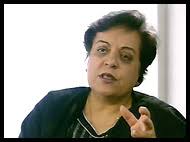


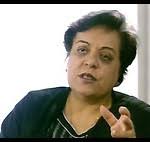
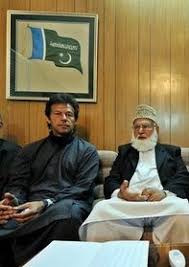
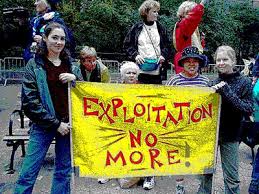




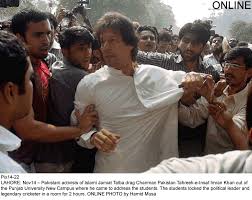







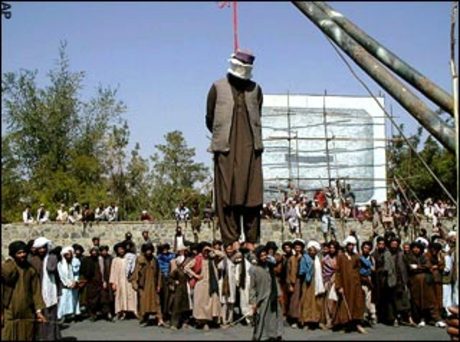

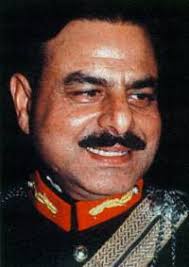
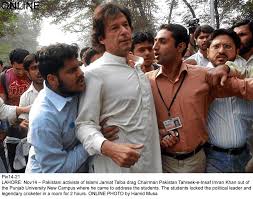
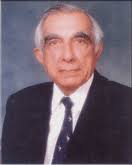


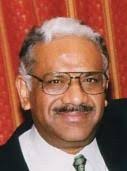
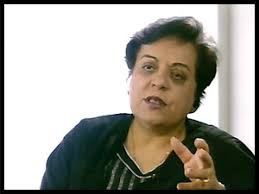
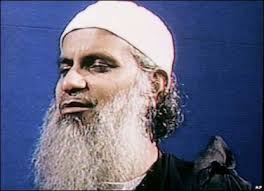
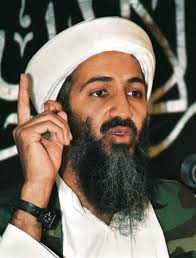


%2520%2520Members%2520of%2520Parliament_files/na-56.jpg)



































